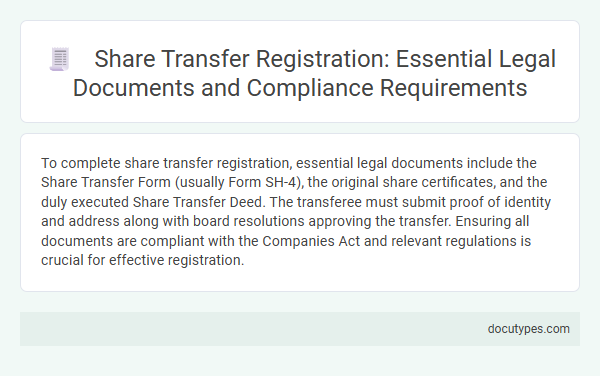To complete share transfer registration, essential legal documents include the Share Transfer Form (usually Form SH-4), the original share certificates, and the duly executed Share Transfer Deed. The transferee must submit proof of identity and address along with board resolutions approving the transfer. Ensuring all documents are compliant with the Companies Act and relevant regulations is crucial for effective registration.
Introduction to Share Transfer Registration
What legal documents are required for share transfer registration? Share transfer registration involves updating the ownership details of shares in the company's official register. This process ensures that the new owner's rights are legally recognized and protects the interests of both parties involved.
Legal Framework Governing Share Transfers
The legal framework governing share transfers is primarily based on company law statutes and corporate regulations. These laws establish the protocols and requirements to ensure the legitimacy and transparency of share transfer transactions.
Key legal documents required for share transfer registration include the share transfer deed, which formalizes the sale or gift of shares between parties. Additionally, the company's board resolution approving the transfer and updated share certificates are necessary to complete the registration process.
Key Documents Required for Share Transfer
| Legal Document | Description | Purpose in Share Transfer |
|---|---|---|
| Share Transfer Deed (Form SH-4) | A legal document evidencing the transfer of shares from the transferor to the transferee. | Records the details of the share transfer and serves as an official instrument for initiating share transfer registration. |
| Original Share Certificate | The physical certificate representing ownership of the shares being transferred. | Required to be surrendered by the transferor to validate and cancel the existing shareholdings before issuing new certificates. |
| Board Resolution | Official resolution passed by the company's board of directors approving the share transfer. | Authorizes the company secretary or authorized personnel to register the share transfer in the company's register of members. |
| Shareholder's Agreement (if applicable) | Contract between shareholders outlining rights and obligations related to shares. | May contain specific provisions or restrictions impacting the share transfer process. |
| Transferor and Transferee Identification Proof | Valid government-issued identification documents such as passport, driver's license, or Aadhaar card. | Required to verify the identities of parties involved in the share transfer transaction. |
| Stamp Duty Payment Proof | Receipt or certificate evidencing payment of stamp duty as required under applicable law. | Ensures legal compliance and validity of the share transfer deed. |
| Updated Register of Members | The company's official record of all shareholders and their shareholdings. | Must be updated post-transfer to reflect new ownership details, confirming registration of the share transfer. |
Share Transfer Deed: Essentials and Execution
The Share Transfer Deed is a crucial legal document required for the registration of share transfers. It must clearly specify details such as the transferor, transferee, number of shares, and the consideration paid. Proper execution of the deed involves signing by both parties and stamping according to the prevailing stamp duty regulations.
Role of the Board Resolution in Share Transfer
Share transfer registration requires specific legal documents to ensure the transaction's validity and compliance with corporate laws. The board resolution plays a crucial role in authorizing and approving the transfer of shares.
- Share Transfer Deed - A legally executed agreement between the transferor and transferee specifying the share details.
- Share Certificate - The original certificate issued to the shareholder that must be endorsed for transfer.
- Board Resolution - A formal approval from the board of directors authorizing the transfer, confirming compliance with company bylaws and statutory requirements.
Notarization and Stamping Requirements
Legal documents for share transfer registration must comply with notarization and stamping requirements to ensure validity. Notarization authenticates signatures, while stamping involves affixing the applicable stamp duty on the share transfer deed. Failure to notarize or pay stamp duty can result in penalties and delayed registration of share ownership changes.
Compliance with Companies Act Provisions
Registering a share transfer requires strict compliance with the Companies Act provisions to ensure legality and validity. You must prepare specific legal documents to facilitate a smooth and compliant transfer process.
- Share Transfer Form (Form SH-4) - This form is mandatory for documenting the transfer of shares between parties as per the Companies Act.
- Share Transfer Deed - A legally binding document that evidences the transfer of shares and must be duly executed and stamped.
- Board Resolution - The company's board must pass a resolution approving the share transfer and authorizing registration accordingly.
Ensuring these documents comply with statutory requirements protects your interests and aligns with regulatory obligations.
Filing and Registering Share Transfers with Authorities
Filing and registering share transfers require specific legal documents to validate the transaction. Essential documents typically include the share transfer deed, the original share certificate, and a duly completed transfer form.
The share transfer deed must be executed by the transferor and transferee, reflecting clear details of the shares being transferred. Submission of these documents to the company's registrar is mandatory for updating the register of shareholders.
Common Pitfalls and Legal Remedies
Share transfer registration requires specific legal documents to ensure validity and compliance. Commonly required documents include the share transfer deed, board resolution, and share certificates.
Omitting any document or submitting incomplete paperwork often leads to registration delays or disputes. Common pitfalls include incorrect execution of the share transfer deed and failure to obtain necessary board approvals. Legal remedies involve rectifying documents, filing appeals with the registrar, or seeking court intervention to enforce compliance.
What Legal Documents Are Required for Share Transfer Registration? Infographic

